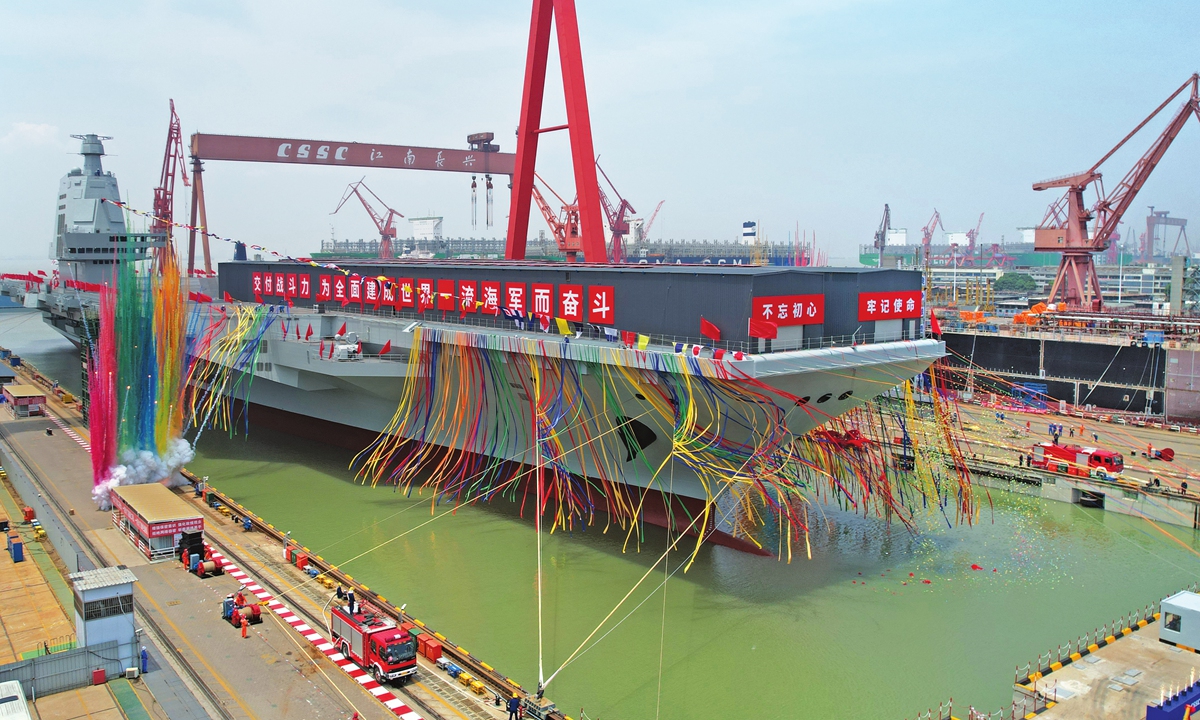
China launches the country's third aircraft carrier, the Fujian, in Shanghai on June 17, 2022. Photo: Xinhua
China will take national security needs and the development of equipment technology into consideration for the country's future aircraft carrier program, the Chinese Defense Ministry said on Thursday, after China's 80,000 ton-class, electromagnetic catapults-equipped third aircraft carrier, the
Fujian, was launched earlier this month.
Senior Colonel Tan Kefei, a spokesperson of China's Ministry of National Defense, made the remarks at a regular press conference when asked if China will build more large aircraft carriers after the
Fujian, and if China is changing its defense policy that is defensive in nature..
Observers believe that China will have more aircraft carriers in the future if these criteria are applied.
It has been made clear at the NATO summit what kind of security situation China will face in the future, as NATO and the US are systematically becoming threats to China, leading to continued degradation of China's surrounding security environment, Song Zhongping, a Chinese military expert and TV commentator, told the Global Times on Thursday.
From a technology development point of view, China should aim for world-class equipment that can defend itself and safeguard peace, Song said.
That means China should have more aircraft carriers, Song said. The US has 11 aircraft carriers, but China will not have an arms race in terms of aircraft carriers with the US, as China will develop aircraft carriers at its own proper pace, he said.
China's development and improvement of weapons and equipment are not aimed at any country or specific target, and will not pose a threat to any country and region, as they only serve the purpose of safeguarding national sovereignty, security and development interests, Tan said.
China will always adhere to a defense policy that is defensive in nature, which is decided by China's nature as a socialist country, its strategic choice of walking a path of peaceful development, and its independent foreign policy of peace, Tan said.
History has proven and will continue to prove that China is a constructor of world peace, a contributor to global development, a protector of international order and a provider of public goods, Tan said.
China launched the
Fujian, the country's third aircraft carrier, in Shanghai on June 17. Having a displacement of more than 80,000 tons, the
Fujian is the country's first carrier equipped with electromagnetic catapults and arresting devices. It is believed to be significantly more powerful than the country's first two aircraft carriers, the 60,000 ton-class, ski jump ramp-equipped
Liaoning and the
Shandong.
China's development of the three aircraft carriers is characterized by succession and innovation, as each carrier was developed based on its predecessor with improvements, Chinese military expert Zhang Xuefeng told the Global Times on Thursday.
If China is to build another aircraft carrier any time soon, it would likely be based on the design of the
Fujian, Zhang said, noting that new and improved aircraft would also be important.
A 100,000 ton-class, nuclear-powered aircraft carrier like those of the US would be more powerful, but also more expensive, so a choice must be made regarding whether to have more but inexpensive carriers, or have less but expensive ones, Zhang said.




